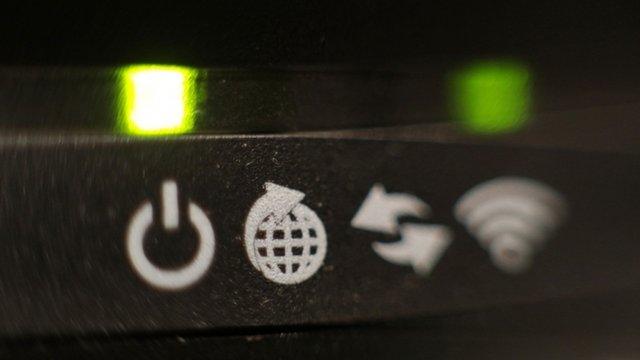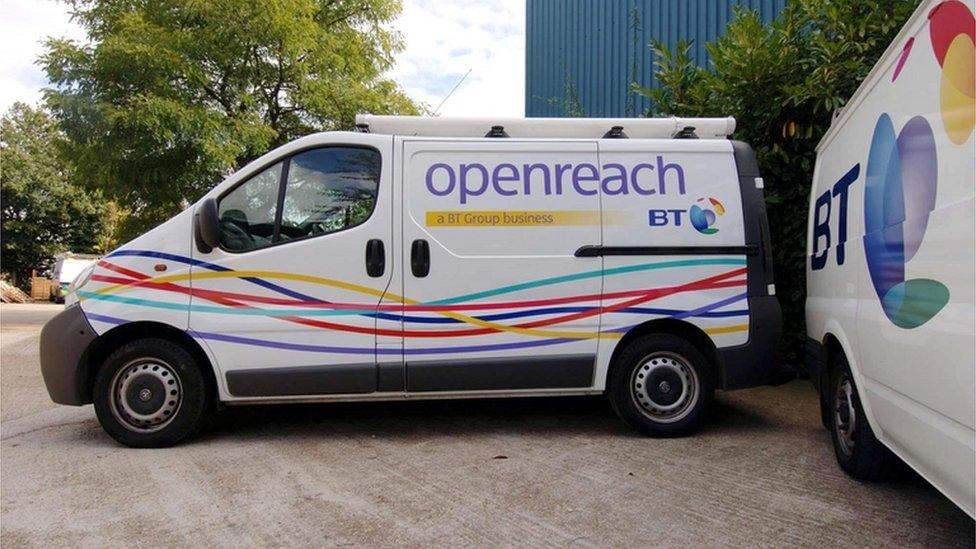Broadband boost for remotest parts of UK
- Published
Openreach infrastructure chief tells Today they are "determined" to deliver broadband across UK
Around 600,000 more homes and businesses could be connected to superfast broadband, after the government recouped £440m.
The cash comes from "efficiency savings" and money returned by BT as part of the government's flagship broadband rollout scheme.
Culture Secretary Karen Bradley said the funds would bring faster broadband to some of the remoter parts of the UK.
Experts said it was not all "new money" but would still be welcomed.
The cash will be made up of £150m in cost savings and the rest in the form of returned subsidies from BT, the government said.
Under a 2010 deal, the government paid BT to roll out superfast broadband in hard-to-reach areas where providers had said it was not cost-effective to install broadband infrastructure.
As part of the agreement, if more than 20% of premises in those areas bought superfast broadband, BT had to repay some of the subsidy.
On average, the take-up has been 30.6%, leading to a forecast repayment of £292m, the Department for Culture, Media and Sport said.

Analysis

By BBC technology correspondent Rory Cellan-Jones
There are two views of the programme to roll out superfast broadband to places which might not be reached by the market.
To the government and BT it's that rare thing, a public/private partnership which is actually going to come in under budget and deliver more than was promised.
To its critics, the Broadband Delivery UK project has seen an overbearing monopoly handed huge sums of public money with little democratic accountability, and the result is that the UK has been given only a semi-fast network which is not future-proof.
But after some early stumbles, BT does look likely to meet the target of putting 95% of homes within reach of superfast broadband by 2017 - and this new investment could mean that 97% are reached by 2020.
The programme is doing what it promised - and the UK is ahead of other major European countries in rolling out superfast broadband.
Ah, say the critics, but only if you think a broadband connection that still makes its final journey into homes via a copper wire is superfast. If you're looking at fibre direct into the home - something even the government says should now be seen as the gold standard for broadband - the UK is still in the slow lane.
Openreach's answer to this is that a new "amazing" technology, called G.fast, will make it possible to achieve speeds of over 100 megabits per second over the copper connections.
The prospects for those people still waiting for any kind of decent connection have brightened slightly - but the row continues over what kind of broadband network will make the UK fit for the future.

'Not new money'
The extra funds will be spent in all areas of the country through the Broadband Delivery UK scheme.
Ministers set up the programme so that by the end of next year, 95% of UK premises would be able to buy superfast broadband - defined as 24Mbps. Such speeds enable families to stream TV on multiple devices at the same time.
The extra funds are designed to reach the remaining 5% of the UK and improve speeds where coverage is patchy.
"The key point is this is not £440m of new money," said Andrew Ferguson, consumer telecoms expert at Think Broadband.
Of the £292m to be returned by BT, the company has already announced about £150m, he said.
Still, regardless of the source of the funds, more money going into infrastructure is "good news", he said.
"The pace of broadband rollout doesn't necessarily match what everyone wants and households aren't necessarily getting as much information as they would like," he added.


Net connections regularly drop out altogether say Pudlestone residents
Case study: Pudlestone, North Herefordshire
The village of Pudlestone in North Herefordshire is one rural location where higher speed broadband cannot come fast enough. The nearest telephone exchange for Pudlestone is about three kilometres from residents' homes meaning speeds are low. Pudlestone villagers have run a co-ordinated campaign to highlight the slow speeds they get and have written to politicians and BT to in a bid to accelerate work to improve speeds.
Linda Fryer, secretary of the Pudleston village hall committee, said everyone in the village was "fed up" adding that it was "extraordinary" if anyone's net connection went faster than one megabit per second (Mbps).
"I can't use Facetime to talk to my children, I can't download films and using things for shopping and banking can be very difficult when the thing drops out," she told the BBC.
Local residents are also wondering why they pay the same monthly fees as others in nearby towns who are enjoying speeds much closer to the national average of 28Mbps.
Retired nurse Judy Thompson said: "If you went in to a restaurant and ordered a cheese sandwich, why would you pay the same price as someone getting lobster? I just think it is completely unreasonable."
Mrs Thompson said she and her husband had sought help from BT but, so far, its advice had made no difference.

Kim Mears, the managing director for infrastructure delivery at BT's Openreach division, told the BBC's Today programme that there was "still more to be done" to improve broadband speeds in some rural areas.
However, she added that 4.5 million rural homes had already benefited from BT's efforts and that the company was "absolutely determined to look at how we go further and faster".
'Win-win'
The company has faced criticism for the speed of the rollout and the quality of the broadband coverage.
However, the government and BT said it was a "win-win" in that more households were taking it up, triggering clawback payments that would help other premises access faster broadband speeds.
"We're delighted that the success and efficiency of our delivery will mean hundreds of thousands more homes and business could get faster broadband than originally expected," a BT spokesman said.
The government has not set a timeline for when the 600,000 premises will benefit.
It comes after Chancellor Philip Hammond announced £1.14bn in government funds in last month's Autumn Statement to improve fibre broadband and develop 5G.
- Published29 November 2016

- Published22 November 2016

- Published19 July 2016